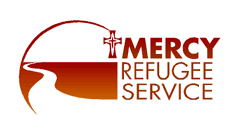September 24, 2018
Mercy Day

Sponsored and facilitated by Mercy Refugee Service Australia
At the Mercy International Association Leaders' Conference, Dublin, 2002 one of the themes reflected on by the Leaders was the displacement of peoples in our world.
It is this issue of 'displacement' that was taken up for further in-depth reflection, analysis and action at a recent meeting in Johannesburg. Concerned with forced displacement and other international issues that impinge on our humanitarian responses to those who are suffering, eight Mercy women gathered in Johannesburg to participate in a think-tank.
Participants came to Johannesburg from the following workplaces:
As a result of our work together during these days, our sharing, analysis, reflection and prayer has led us to this final statement.
We wish to circulate this statement among our Mercy groups worldwide for further reflection and action.
Statement from the Group of Mercy women who met in Johannesburg September 2003
"We will centre on the lens of displacement... where we are involved in ministry with displaced people, we will share what we are doing with the wider mercy family... " (Mercy International Association Leaders Team Conference 2002)
"I know the Mercy of God is pushing through the porous places- birthing in the places of dislocation." (Anne Campbell. rsm Meeting Place Responses. Mercy Website)
At this meeting of Mercy women in Johannesburg September 2003 we affirmed the global response to refugees, asylum seekers, displaced people, those in detention and those in post conflict situations.
We reflected on:
Our reflection, prayer and analysis challenge us to bring these insights to our Mercy global networks and to each Sister of Mercy.
Aware that the needs and aspirations of those displaced is the starting point of Mercy response.
We ask you Mercy Sisters everywhere and especially Mercy Leaders to consider the following actions:
In our partnerships we stress the importance of reflection and analysis, of acknowledging God's Spirit in all religious traditions of inclusiveness and respect for the equality of women.
To serve the poor, sick and ignorant in areas of displacement is a Mercy challenge for all of us today.